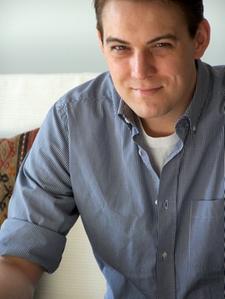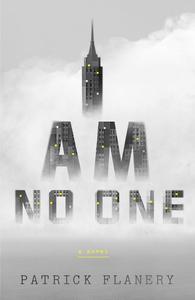
|
|
| photo: Andrew van der Vlies | |
Patrick Flanery was born in California and raised in Omaha, Neb. After earning a BFA in Film from New York University's Tisch School of the Arts, he worked in the film industry before moving to the U.K., where he completed a doctorate in 20th-century English Literature at Oxford. He has written for the Washington Post, the Guardian and the Times Literary Supplement, and is a professor of Creative Writing at the University of Reading. His third novel, I Am No One, is published by Tim Duggan Books (July 5, 2016).
On your nightstand now:
Philip Roth's I Married a Communist and Wolfgang Hilbig's I, both as research of a kind for a new project. Alongside them are Edward P. Jones's The Known World and Elizabeth Bishop's collected poems, for teaching preparation, and Graham Greene's The Heart of the Matter.
Favorite book when you were a child:
I had more favorite books as a child than years of childhood, and the list shifted from month to month. Tolkien's Lord of the Rings was an early favorite, supplanted by Madeleine L'Engle's A Wrinkle in Time after I played her strange child character Charles Wallace Murry in an early stage adaptation of the book. When I was nine, Karen Blixen's Out of Africa became my favorite (it was the first "adult" book I read), and then J.G. Ballard's Empire of the Sun when I was 12. When I was 16, I read all of E.M. Forster's novels and short stories, and for a long time Howards End was my favorite book. I was in a hurry to be grown up, and reading seemed a way of achieving that. From the books that stand out in my memory, it seems clear that I was looking for escape from Omaha, where I grew up, and also for stories of outsiders.
Your top five authors:
How are we defining "top?" Top stylists? Top authors for blowing my mind or turning me emotionally inside out? Top authors for expanding my sense of what is possible in fiction? Top authors for their sheer audaciousness? If I think of all those criteria, I end up with Dostoevsky, Proust, Melville, Kafka, and Borges, and then still another score or more in addition. These five are all dead and white and men, and I'm not sure that's acceptable, but if I had to pick the authors whose bodies of work I most admire, and who leave me feeling transformed when I come to the end of a book, then I would still--probably--choose these. And then again I might not. I can think of a number of alternative lists: Lydia Davis, J.M. Coetzee, Toni Morrison, Philip Roth, and Marilynne Robinson or Ali Smith, Don DeLillo, Nadine Gordimer, Roberto Bolaño and César Aira. Perhaps it's about mental constellations of work that astounds me more than a single list of "tops."
Book you've faked reading:
Cervantes's Don Quixote, although that's not quite true. I started it and got about a third of the way through before putting it aside, but I blame the translation I was reading. I keep meaning to try Edith Grossman's acclaimed version, or learn Spanish (less likely in the short term).  Book you're an evangelist for:
Book you're an evangelist for:
I have to choose two books. For a decade I have been telling friends and strangers that they must read Zoë Wicomb's astonishing David's Story, as well as Marlene van Niekerk's very different and no less amazing Agaat. Both are about South Africa in its period of transition to democracy and the aftermath of apartheid. Both are about the place of women in repressive patriarchal societies. Both are complex, brilliant narratives of loss that also set out to expand what is possible in fiction.
Book you've bought for the cover:
Bound for Glory: America in Color 1939-43. The couple depicted on the cover look like the real-life counterparts for Grant Wood's American Gothic and in their faces I feel as though I can see the lives and experiences of my grandparents and other extended family, hardscrabble migrants from Oklahoma and Texas who made their way west and in some cases stayed put in the Great Plains, rebuilding after the Dust Bowl.
Book you hid from your parents:
I hid two books: The Faber Book of Gay Short Fiction and Edmund White's A Boy's Own Story. Both lived between my mattress and box springs when I was in high school. Then, when I went away to college, I drive-by donated them through the returns box at the University of Nebraska at Omaha's library. The Faber anthology shows up in their catalogue online, and there's a later edition of White's novel also in the collection; I like to think the copy I donated was worn out by compulsive reading.
Book that changed your life:
I'm embarrassed to admit it, but that honor goes to Evelyn Waugh's Brideshead Revisited, although not for the reasons one might expect. I have no sympathy with Waugh's politics or ideology, but I read his most romantic novel at a crucial juncture, just after finishing my undergraduate degree at NYU. Waugh painted a picture of Oxford that was so intoxicating I decided to apply there for graduate school. I was accepted and wrote a doctorate on the publishing and adaptation histories of Waugh's work, although within six months of starting the research I couldn't stand the man and began to hate his books as well. I think, though, that it can be productive to force oneself into a critical relationship with writing that does not fire one's own esthetic or ideological sympathies. Evelyn Waugh is the reason I moved to Britain. How strange that now seems.
Favorite line from a book:
"I would prefer not to." --Herman Melville's Bartleby, the Scrivener
Five books you'll never part with:
Again, I struggle to pick just five, but the ones I've chosen are more books that I know I'll return to, and which I hope to reread in the future, which is a way of not parting with them: Ralph Ellison's Invisible Man, J.M. Coetzee's Age of Iron, Dostoevsky's Crime and Punishment, Proust's In Search of Lost Time (which I'm still trying to finish) and Melville's Moby-Dick.
Book you most want to read again for the first time:
There is still nothing to match the wild inventiveness of Jorge Luis Borges's Labyrinths. The first reading, in my early 20s, seemed to bend and stretch and invert my thinking, and to demonstrate that fiction could do anything, at any length.
Book that made you want to be a writer:
Ernest Hemingway's The Sun Also Rises. I read it as a sophomore in high school. Maybe it was the journalistic style (I was on the student newspaper), or the silly but memorable dialogue ("Let's get tight"), or the fact that Hemingway was writing about Americans in Europe and I had decided there was nothing more thrilling than the idea of living in another country. Or maybe it was my high school English teacher, Mr. Coulter, who was the first to demonstrate to me how a writer can encode symbol and meaning in an otherwise realist narrative, leaving clues for readers to discover. I wrote Hemingway-inspired short stories for the rest of my high school years, but have not read him since. Some writers do that, though, providing signposts that can lead you off to find your own territory.

